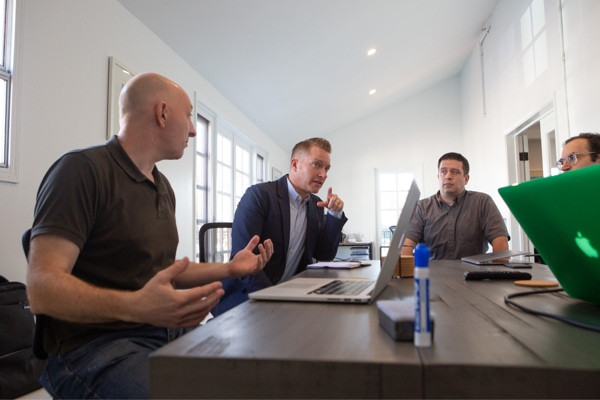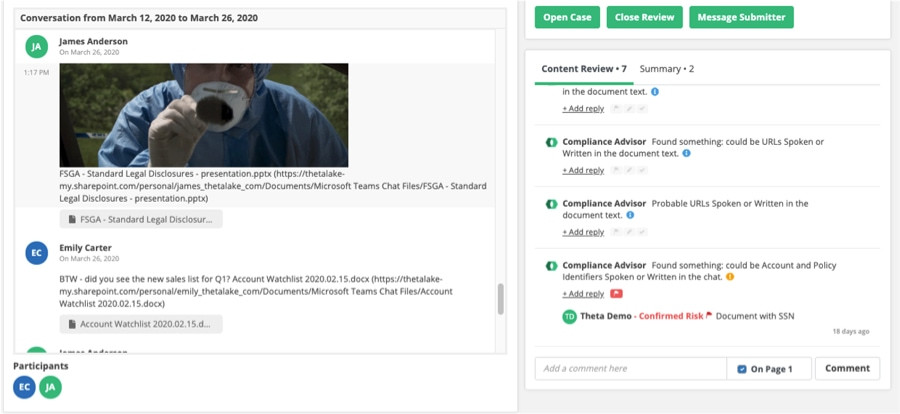We all know timing is everything, and when it comes to the world of venture capital, timing can make or break a startup’s success. For Devin Redmond and Rich Sutton, co-founders of Theta Lake, they could never have predicted in 2017 that a global pandemic would place their innovation in such high demand in 2020.
I first learned of Theta Lake back in early 2019 through joint customers who were using the company’s risk compliance suite with Cisco collaboration technologies. After meeting Devin and Rich, my first thought was: “Wow. These guys sure are passionate about compliance.” Prior to founding Theta Lake, Devin and Rich both had long careers in this space, including co-founding Nexgate, a social media governance platform. These are entrepreneurs who eat, sleep and breathe this world.
So, after Nexgate was acquired by Proofpoint, the team started setting their sights on their next compliance challenge: managing risk across an increasingly distributed workforce with a growing number of communication technologies.
“We recognized that security and compliance technologies weren’t really set up to deal with these new collaboration platforms, where people can communicate in multiple different ways and today are largely unmonitored,” says Devin. “Whether employees are screen sharing, using a camera, transferring a file, typing in a chat or talking over a voice channel, enterprises need a way to manage risks around information leakage, conduct and behavior-based activities and even regulatory compliance.”
In 2017 Devin and Rich started Theta Lake, and over the next few years, they added integrations across several leading Collaboration suites including Cisco WebEx, Microsoft Teams, RingCentral, and Zoom among others. So, when the pandemic hit and enterprises grappled with how to secure their newly remote workforces, they were ready.

Using AI to Identify Risk in Today’s Remote Workforce
“Seemingly overnight, companies went from a few hundred employees using collaboration tools to thousands of employees using it as their primary information-sharing method,” says Devin.
This meant that organizations who once maintained tight control over their physical workplaces found themselves trying to manage compliance over information that now lived inside screens shared across a remote-based workforce.
It quickly became apparent that the massive amount of information flowing across chat rooms and email to video screens, where even one URL shared across a WebEx platform can leave a company vulnerable, was surging far beyond the economies of efficiency for humans to tackle on their own.
“You can imagine the challenge that a risk professional would go through on a compliance or security team today to monitor and supervise just a single virtual meeting,” Devin notes. “The only way to do it before Theta Lake was to actually watch the whole meeting, pause it and take notes. If we had an hour-long meeting, it would take someone three hours just to do the basic review, not including any follow-up action.”
To solve for this, Theta Lake leveraged AI to help humans identify risk areas across visual and spoken, typed and written content.
“Today, we can flag text out of a screen share and say, ‘Hey, this looks like a CRM app shared on screen with a credit card number display.’ Or flag the moment when someone says, ‘I am going to show something confidential now’ and then holds up a document that doesn’t say ‘confidential’ anywhere on it. So, using natural language processing, machine learning, advanced concept embeddings and image extraction helps us identify all those types of risk,” Devin explains.
Theta Lake has taken the technology one step further, teaching their AI systems to “learn” from previous review actions. “So, if nine times out of 10, a reviewer says, ‘Escalate this,’ on the tenth time, the system should automatically prompt and say, ‘Do you want to escalate this because the last nine times you did the same thing?’”
Together, these two areas have greatly facilitated the detection work by helping teams find the proverbial “needle in the haystack” and provide much more coverage than humans could ever perform alone.

Looking Ahead to Managing Content in a Multimedia World
Already, wide sectors of industry, from financial and pharma, government to healthcare, are taking a new look at their compliance procedures and benefitting from solutions like Theta Lake’s technology.
When I asked Devin about what lies ahead for Theta Lake, he says they’ll be focusing on tackling the security and compliance of meshed content – being able to understand connections as they happen across collaboration platforms, such as a chat turning into a video meeting in which a document or presentation may be shared.
“Being able to understand that full flow and risk that’s related to the entirety of that conversation across channels, even if it’s across different platforms, will be the next frontier of risk compliance in a modern, collaboration-first workplace,” says Devin.
If the past provides any clues, it’s clear that Theta Lake will be well prepared to meet the challenges of this new frontier — not by peering through a crystal ball as entrepreneurs are often asked to do, but rather, as Devin notes, “more like through a telescope where we know what’s on the horizon with all of those experiences from our past putting everything into focus.”
